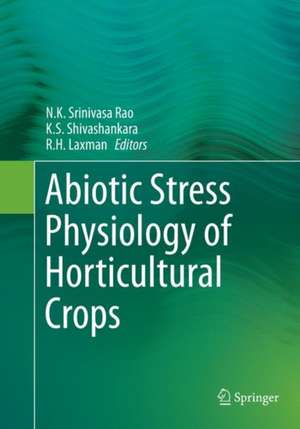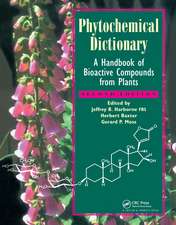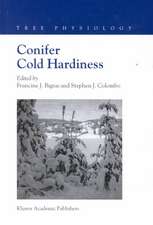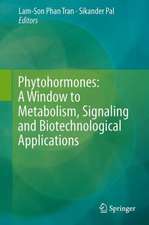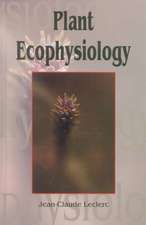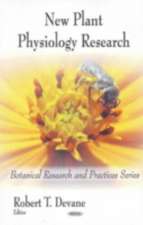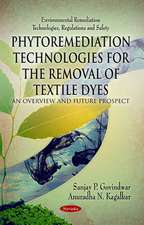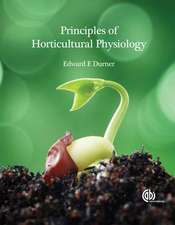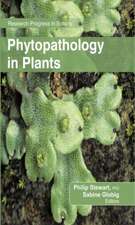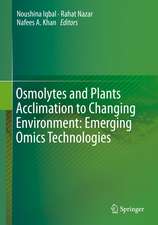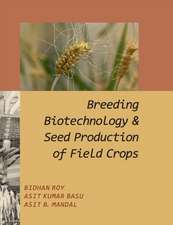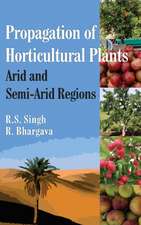Abiotic Stress Physiology of Horticultural Crops
Editat de N.K. Srinivasa Rao, K.S. Shivashankara, R.H. Laxmanen Limba Engleză Paperback – 22 apr 2018
This book brings together recent advances in the area of abiotic stress tolerance in various vegetables, fruit crops, plantation crops and tuber crops. The main challenges to improving the productivity of horticultural crops are the different types of abiotic stresses generally caused by climate change at the regional and global level. Heat, drought, cold and salinity are the major abiotic stresses that adversely affect growth and productivity and can trigger a series of morphological, physiological, biochemical and molecular changes in various horticultural crops.
To date, there are no books covering horticultural crop-specific abiotic stress tolerance mechanisms and their management. Addressing that gap, the book is divided into 2 sections, the first of which highlights recent advances in the general aspects of abiotic stress tolerance like the role of hormones, reactive oxygen species, seed treatments, molecular mechanisms of heat tolerance and heavy metal toxicity, while the second focuses on the abiotic stress tolerance mechanisms of various vegetables, fruit crops, plantation crops and tuber crops. It includes comprehensive discussions of fruit crops like mango, grapes, banana, litchi and arid zone fruits; vegetables crops like tomato, capsicum, onion and tuber crops; and plantation crops like coconut, areca nut, oil palm and black pepper. Among the strategies for plant stress survival, examples of both avoidance and tolerance relevant to particular crops are examined in detail, supported by selected comprehensive case studies of progress. As such, the book offers a valuable resource suited for scientists and graduate students working in the fields of crop improvement, genetic engineering, and the abiotic stress tolerance of horticultural crops.
| Toate formatele și edițiile | Preț | Express |
|---|---|---|
| Paperback (1) | 798.07 lei 38-44 zile | |
| Springer India – 22 apr 2018 | 798.07 lei 38-44 zile | |
| Hardback (1) | 967.88 lei 3-5 săpt. | |
| Springer India – 18 apr 2016 | 967.88 lei 3-5 săpt. |
Preț: 798.07 lei
Preț vechi: 1050.09 lei
-24% Nou
Puncte Express: 1197
Preț estimativ în valută:
152.71€ • 159.87$ • 126.36£
152.71€ • 159.87$ • 126.36£
Carte tipărită la comandă
Livrare economică 01-07 aprilie
Preluare comenzi: 021 569.72.76
Specificații
ISBN-13: 9788132238256
ISBN-10: 8132238257
Pagini: 368
Ilustrații: XIV, 368 p. 65 illus., 41 illus. in color.
Dimensiuni: 178 x 254 mm
Ediția:Softcover reprint of the original 1st ed. 2016
Editura: Springer India
Colecția Springer
Locul publicării:New Delhi, India
ISBN-10: 8132238257
Pagini: 368
Ilustrații: XIV, 368 p. 65 illus., 41 illus. in color.
Dimensiuni: 178 x 254 mm
Ediția:Softcover reprint of the original 1st ed. 2016
Editura: Springer India
Colecția Springer
Locul publicării:New Delhi, India
Cuprins
Part 1. Mechanisms of Abiotic Stress Tolerance Responses.- 1. Physiological and Morphological Responses of Horticultural Crops to Abiotic Stresses.- 2.Role of Plant Hormones in Abiotic Stress Tolerance Responses.- 3. Role of Antioxidants in Abiotic Stress Tolerance Responses.- 4. Molecular Mechanisms of Thermotolerance.- 5. Mechanisms of Heavy Metal Toxicity in Plants.- 6. Seed Priming for Abiotic Stress Tolerance: An Overview.- Part 2. Abiotic Stress Tolerance in Horticultural Crops: Vegetables.- 7. Tomato.- 8. Onion.- 9. Capsicum (Hot Pepper and Bell Pepper).- Part 3. Abiotic Stress tolerance in Horticultural Crops: Fruit Crops.- 10. Mango.- 11. Grapes.- 12. Banana.- 13. Arid Zone Fruit Crops.- 14. Litchi.- Part 4. Abiotic Stress Tolerance in Horticultural Crops: Plantation and Tuber crops.- 15. Coconut and Arecanut.- 16. Cashew and Cocoa.- 17. Water Stress Induced Changes in Black Pepper.- 18. Oil Palm.- 19. Tuber Crops.
Notă biografică
Dr. N. K. Srinivasa Rao, Principal Scientist (Plant Physiology-Retd.) and Ex Emeritus Scientist, Indian Institute of Horticultural Research, Bangalore, was born on 31.01.1950 at Bangalore. He belongs to the first batch of Agricultural Research Service. He has passed ARS examination with first rank and the joined ICAR service on 29.11.1976 at IIHR, Bangalore in the discipline of Plant Physiology. He has contributed significantly to the understanding of mechanism of abiotic stress tolerance in horticultural crops.
Some of his publications are:
1.Srinivasa Rao, N.K. and Bhatt, R.M. (1990) Response of photosynthesis to Water stress in two eggplant Cultivars (Solanum melongena L.) Photosynthetica, 24:
2. Srinivasa Rao, N.K. and Bhatt,R.M.(1990). Effect of two temperature regimes on photosynthesis and growth in two cultivars of tomato (Lycopersicon esculentum Mill.). Photosynthetica 26: 625-63
Dr. Kodthalu Seetharamaiah Shivashankara is currently working as principal scientist in Indian Institute of Horticultural Research, Bangalore.
Some of his publications are:1) Sheshshayee, M.S., Shivashankara, K.S., Ramaswamy, G.S., Davendra, R., Shankar, A.G., Prasad, T.G., Udaya Kumar, M.,1991. A new method to generate different CO2 concentrations to develop CO2 response curves. Curr. Sci., 62: 538‑540.
2) Shivashankara, K.S., Mithila,J and Maiti, S., 2000. A new method for vegetative multiplication of betelvine. J. Plantation Crops. 28(2): 94-98
Dr. Laxman Ramanna Hunashikatti is currently working as principal scientist in ICAR-Indian Institute of Horticultural Research, Bengaluru.
Some of his publications are:
1.Srinivasa Rao, N.K. and Bhatt, R.M. (1990) Response of photosynthesis to Water stress in two eggplant Cultivars (Solanum melongena L.) Photosynthetica, 24:
2. Srinivasa Rao, N.K. and Bhatt,R.M.(1990). Effect of two temperature regimes on photosynthesis and growth in two cultivars of tomato (Lycopersicon esculentum Mill.). Photosynthetica 26: 625-63
Dr. Kodthalu Seetharamaiah Shivashankara is currently working as principal scientist in Indian Institute of Horticultural Research, Bangalore.
Some of his publications are:1) Sheshshayee, M.S., Shivashankara, K.S., Ramaswamy, G.S., Davendra, R., Shankar, A.G., Prasad, T.G., Udaya Kumar, M.,1991. A new method to generate different CO2 concentrations to develop CO2 response curves. Curr. Sci., 62: 538‑540.
2) Shivashankara, K.S., Mithila,J and Maiti, S., 2000. A new method for vegetative multiplication of betelvine. J. Plantation Crops. 28(2): 94-98
Dr. Laxman Ramanna Hunashikatti is currently working as principal scientist in ICAR-Indian Institute of Horticultural Research, Bengaluru.
Textul de pe ultima copertă
This book brings together recent advances in the area of abiotic stress tolerance in various vegetables, fruit crops, plantation crops and tuber crops. The main challenges to improving the productivity of horticultural crops are the different types of abiotic stresses generally caused by climate change at the regional and global level. Heat, drought, cold and salinity are the major abiotic stresses that adversely affect growth and productivity and can trigger a series of morphological, physiological, biochemical and molecular changes in various horticultural crops.
To date, there are no books covering horticultural crop-specific abiotic stress tolerance mechanisms and their management. Addressing that gap, the book is divided into 2 sections, the first of which highlights recent advances in the general aspects of abiotic stress tolerance like the role of hormones, reactive oxygen species, seed treatments, molecular mechanisms of heat tolerance and heavy metal toxicity, while the second focuses on the abiotic stress tolerance mechanisms of various vegetables, fruit crops, plantation crops and tuber crops. It includes comprehensive discussions of fruit crops like mango, grapes, banana, litchi and arid zone fruits; vegetables crops like tomato, capsicum, onion and tuber crops; and plantation crops like coconut, areca nut, oil palm and black pepper. Among the strategies for plant stress survival, examples of both avoidance and tolerance relevant to particular crops are examined in detail, supported by selected comprehensive case studies of progress. As such, the book offers a valuable resource suited for scientists and graduate students working in the fields of crop improvement, genetic engineering, and the abiotic stress tolerance of horticultural crops.
Caracteristici
The first published book focusing on stress physiology of horticultural crops Provides a timely update on the recent progress on all aspects of plant's perception, signalling and adaptation to a variety of abiotic environmental stresses Provides a detailed illustration on mechanism of abiotic stress tolerance in many horticultural crops Gives a detailed account of adaptation strategies to overcome the abiotic stresses in horticultural crops Includes supplementary material: sn.pub/extras
